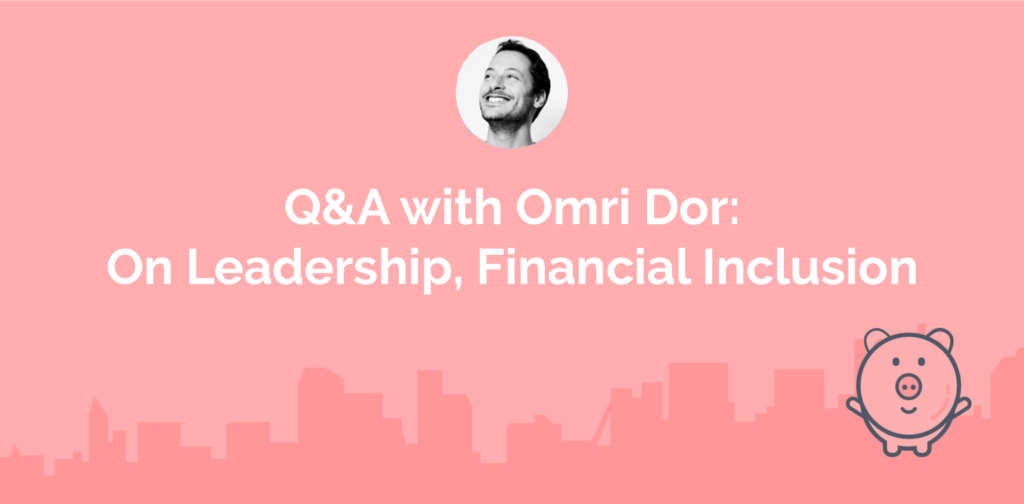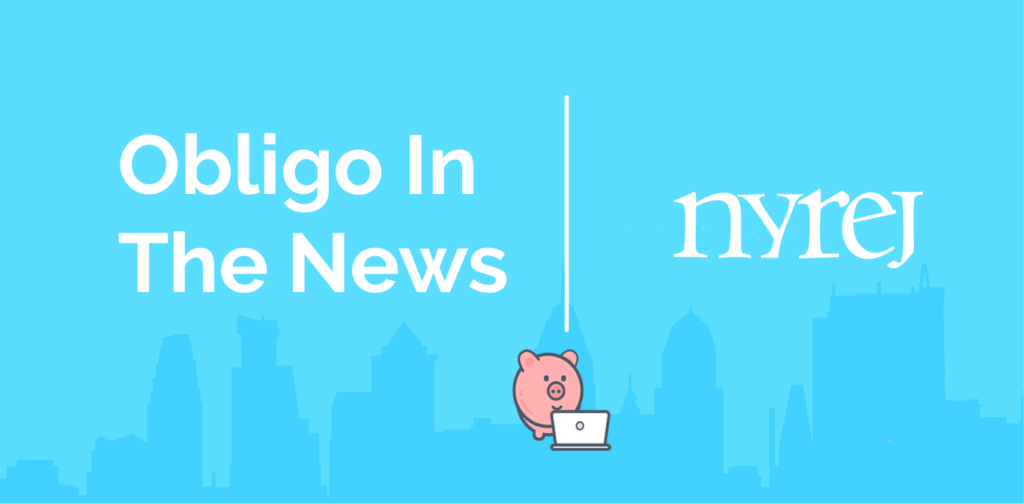As part of Authority Magazine‘s series on businesses that promote financial inclusion, our COO Omri Dor shared his stories and insights as a business leader and fintech entrepreneur.
Can you tell us a bit about how you grew up?
I grew up in Israel and I’ve always been a tech geek, programming from a young age. I served in the Israeli army for three years in the cyber intelligence unit, also known as 8200. After that, I studied electric engineering and physics in Technion, which is kind of like the Israeli MIT. I then had the pleasure of working for Google as a software developer in both California and New York. I also worked for Facebook in London, where I gained most of my development experience. After going back to Israel, I teamed up with my older brother Roey to found Obligo, and once we raised our seed funding, I moved to the United States in 2018.
Is there a particular book that made a significant impact on you? Can you share a story or explain why it resonated with you so much?
There are two books that ignited two passions in me. The first book was The Selfish Gene by Richard Dawkins, which I read when I was around 20. I’ve been good at science throughout my school years, and I’ve always been “the smart kid,” but I didn’t really have an appreciation for science as a thought discipline, as a mechanism for discovering the truth and a mechanism to keep yourself honest in the face of evidence, in the face of what’s happening around you. I’ve only gained that deeper appreciation of science after reading that book.
The second book was How to Win Friends and Influence People by Dale Carnegie, which really opened my mind to the whole world of human interaction as its own distinct area of knowledge, expertise and passion. To a large degree, I see my role today at Obligo being all about understanding the human interactions, the company culture and how to make it better.
Do you have a favorite “Life Lesson Quote”? Do you have a story about how that was relevant in your life or your work?
One quote I like is “A’s hire A’s, B’s hire C’s”. We have all heard this statement in the context of business and especially early stage startups, but I think it has deeper meanings as well. If you surround yourself with amazing friends, that social circle will naturally attract more amazing people. But if you associate yourself with a**holes, your entire social circle will deteriorate.
How do you define “Leadership”? Can you explain what you mean or give an example?
I think there are different ways to lead and different styles of leadership. Typically when people think about leaders, they think about the President of the United States, they think about Elon Musk, they think about people who are incredibly charismatic, and people seem to be drawn to them. In some cases that’s a style of leadership or how leadership is perceived. I think leadership can also be very modest. Some leaders are more hidden — they do the day-to-day work or things that might not be as fanciful as standing on a big stage and making big speeches. To me, leadership is about setting a mission and a vision. I think what’s common in all types of leadership, or at least the good ones, is that essentially they are servants of some mission or vision, and people who follow those leaders actually follow that mission and vision, not the individual. I think some of the worst examples of leadership are when people would follow the individual with this kind of “personality worship,” but the best kind of leaders just draw from higher ideals and missions. They would say, “Listen, I’m going to this destination and you are welcome to join me on that journey. But the journey isn’t to me, the journey is to this other place.”
Can you share the most interesting story that happened to you since you began your career?
Before we raised our seed funding, Roey and I were doing the rounds, meeting with investors and trying to pitch them the idea for Obligo. There was one particular investor who had the notion that what we’re doing is “too easy” and doesn’t have sufficiently complicated technology behind it. He agreed that the opportunity was huge and there was a lot of value to be made, but he felt it wasn’t difficult enough. He proceeded to describe a company in his portfolio, which he considered amazing. That company had very fancy technology that enabled them to make some small margin on top of a market where seemingly there were no more margins to be made. We left his office and on the way down to the elevator, I came up with an interesting parable to that situation.
The parable was about an orange. You have two halves of an orange. One of them is juicy and fresh, and the other one’s been completely squeezed dry. So the founder tells the investor, look, I found this amazing, juicy and fresh half of an orange! The investor says, listen, I have this incredible company that can take this half of the orange that’s already been squeezed dry, and they have this very special technology that will squeeze it ever more tightly, until it’s able to get five or six extra drops. The founder asks, but what about this other half of the orange? We can just grab it and squeeze it. And the investor says, yeah, but anyone can do that. That was one of the funniest stories that I recall during our fundraising days.
What exactly is Financial Inclusion?
Financial inclusion is the effort to make financial products and services accessible to all individuals and businesses. It means tackling the challenges that prevent people from bettering their lives. For Obligo, our goal is simple: we want to make renting a home as easy as getting a hotel room. The process of paying and receiving a security deposit is the main barrier in this case. We provide a simplified rental experience and remove the burden of security deposits, making the interactions between renters and landlords more transparent and trustworthy, while keeping all parties accountable.
Can you tell our readers a bit about your work to promote Financial Inclusion? Without saying names, can you share a story about a person who was helped by your initiative?
At Obligo, we harness financial technology to build trust between renters and landlords. We started out helping renters and landlords get rid of security deposits, which is typically at least one month’s rent. By using Obligo’s deposit-free service, renters can avoid having their money locked away and collecting dust.
Our solutions provide flexibility, peace of mind and financial freedom to renters, helping them more easily move into new homes. We also offer renters more avenues to qualify for an apartment, whether it’s with a deposit, with a high FICO score, with enough money in the bank or with a guarantor who has enough money in the bank. Our philosophy is that you don’t need ALL of these things to qualify, only one or two. That’s how we can make the experience simpler, shorter, while working towards inclusion. We believe that everyone should have a path for housing.
As we evolve, our solution suite today includes not only a flexible credit-backed deposit alternative, but also free certified electronic move-in payments and automated electronic deposit refunds. These products all help eliminate antiquated and opaque financial processes and paperwork. We want to bring simplicity and trust into the home rental process, so everyone can benefit from new financial solutions, regardless of their level of financial literacy.
On the flip side, our technology removes many operational and regulatory challenges faced by landlords, enabling them to be more financially inclusive to their renters. “We put cash back in the hands of people that really need it. We are stewards as business owners,” said Ben Nguyen from Real Property Management Heritage in Houston, Texas. “We progress in the world by using Obligo, because it allows us to be inclusive to all renters, and we want renters to feel good about that.” There’s still plenty to be done to further financial inclusion, but hearing stories like this from renters and property owners makes us feel that we’re on the right track.
Can you articulate to our readers a few reasons why it is so important for businesses to promote financial inclusion?
Businesses often have the resources to impact societal behaviors and improve the well-being of the community. With so many people lacking understanding and access to basic financial services, businesses need to be the vanguards for a more trustworthy world.
Financial inclusion uplifts individuals and their families, changing their way of life for the better. With more flexible financial options, people can maintain security and stability when there is a life-altering event such as a natural disaster, an incident, a job loss, etc.
Can you please share your “5 Steps Businesses Should Take To Promote Financial Inclusion?”
1. Be Trustworthy
A lack of trust in financial institutions and services is one of many reasons a person may be unbanked. That’s why Obligo wants to promote trust and transparency in financial transactions between renters and landlords, while keeping all parties safe and accountable. Mutual trust and accountability are the keys here.
2. Keep It Simple
As we see it, financial inclusion is not just the access and availability of financial services, but also the access to financial knowledge. Businesses benefit from solutions that make people’s lives easier, narrowing the gap between those who are financially savvy and those with lower literacy in this area. At Obligo, our solutions aim to simplify the renting experience for renters and landlords alike. We continuously iterate on our product to deliver a better, more streamlined experience that everyone can benefit from.
3. Be Flexible
Being financially inclusive means taking into account all kinds of financial situations people might be dealing with. For businesses, that means providing flexibility to your customers based on their unique circumstances. Flexibility is built into Obligo’s DNA — our solutions provide renters with flexible options based on their preferences: they can live deposit-free, or pay a traditional deposit and get it refunded electronically. If they get billed for damages at move-out, Obligo lets them pay in monthly installments instead of a lump sum.
4. Help Customers Save Money
A business provides real value to its customers when it helps them improve their financial wellbeing. Obligo’s credit-backed deposit alternative helps people free up cash that might otherwise be locked up in an escrow account. This way, renters can use the available cash on hand to spend, invest, or cover for a rainy day.
5. Provide Convenience
Despite the countless technological advances in financial services, many old-school barriers remain that prevent convenience and efficiency. Obligo’s solution lets renters handle move-in and move-out payments right from their phone. They don’t need to go into a bank for a certified check or sort through excessive paperwork — everything can be done electronically on our platform. We believe that convenient digital solutions will drive financial inclusion, saving people valuable time that could be spent on their work, childcare, hobbies and other important things.
If you could inspire a movement that would bring the most amount of good to the most amount of people, what would that be?
I believe that humankind needs to be a little bit better at organizing. I think we need to get better at how we organize, how we make decisions and how we act for the better good. Surprisingly, one of the testing grounds for new ways of organizing is actually the corporate world, and more specifically, startups. A lot of startup founders and leaders see that they need to find better ways to align people to goals, to increase productivity or to simply work better with each other. I think that a lot of these concepts could potentially inspire better ways to run cities, states and countries.
So the movement I want to see is experimentation with new ways of management. The good methods that we find should gradually infiltrate into the world of government and public service. I think it’s already happening in a sense — agile methodologies, project management methodologies, or KPI-driven management. These things are gradually transitioning over to the public sphere, and I think it’s great. In the grand scheme of things, all startups, ourselves included, are part of that research and development process of how to manage and organize for the benefit of either the employees or the public.
Is there a person in the world, or in the US, with whom you would like to have a private breakfast or lunch, and why?
I’ve always liked Bill Gates. Looking at the most successful technology entrepreneurs, he is clearly the most modest. At some point in time, he was the best developer in the world, at a time when there weren’t that many developers. It’s just refreshing that there’s someone who seems to be so modest and who’s not searching for the limelight all the time.
About Omri Dor

Omri Dor is the co-founder and chief operating officer of Obligo, a startup building trust between landlords and renters using financial technology. Born and raised in Israel, he has always been fascinated by science and technology. After serving in the cyber intelligence unit of the Israeli army for 3 years, he attended Technion — Israel Institute of Technology. Having worked at Google and Facebook, he took his technical expertise and business acumen to found Obligo with his brother, Roey Dor, in 2018.





Leave a Reply